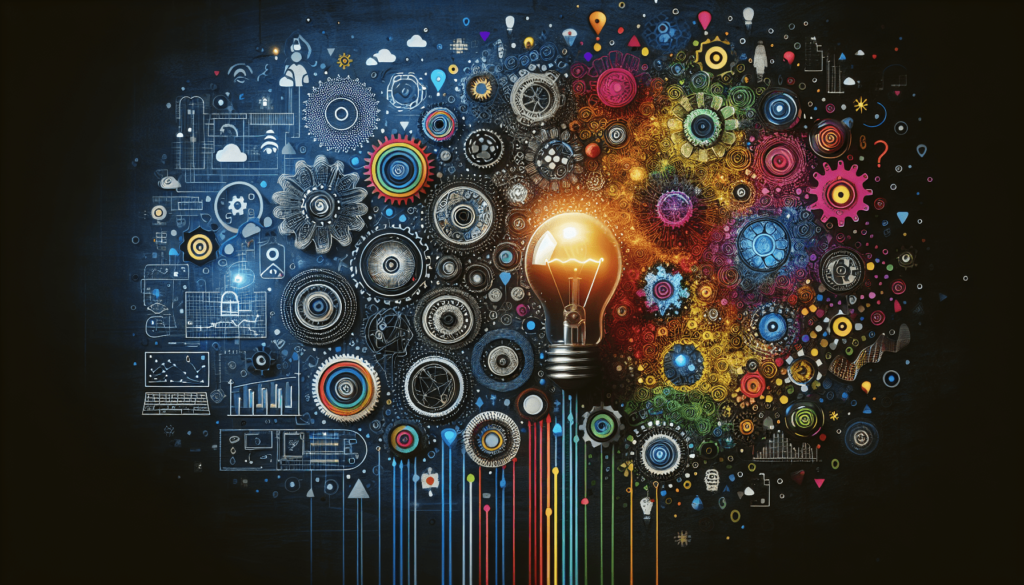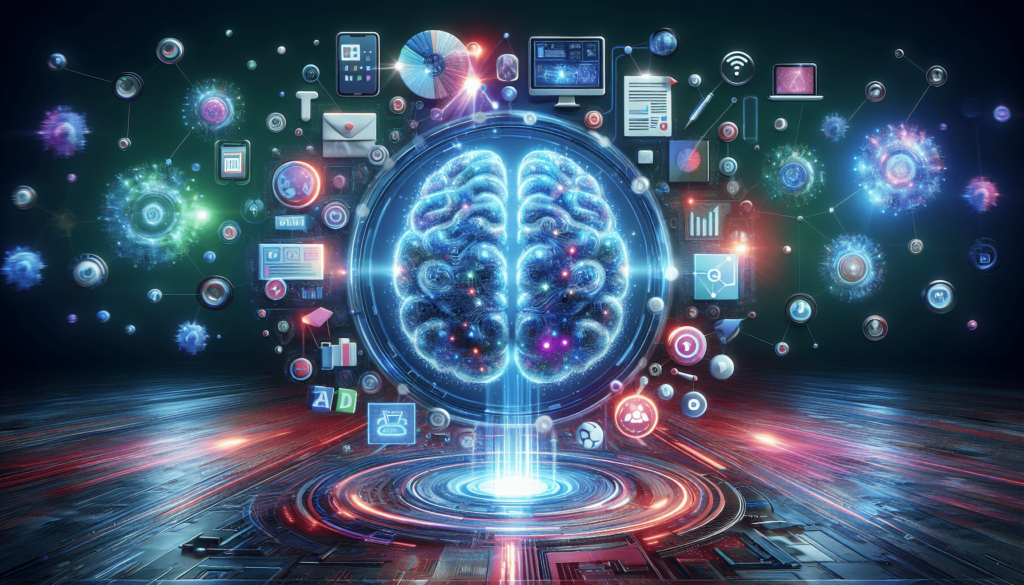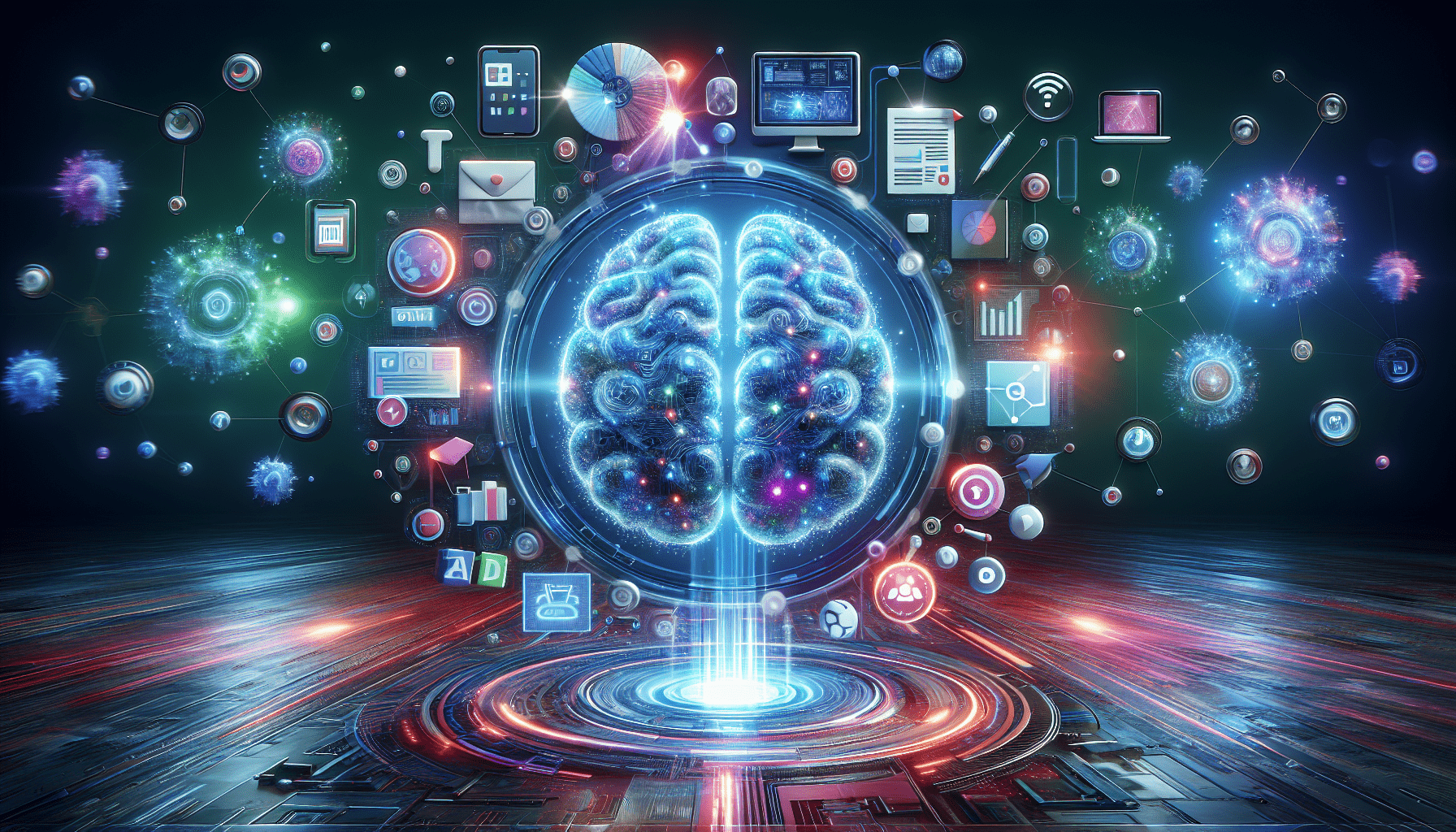Imagine a world where your digital marketing campaigns are not only more effective, but also more efficient. Well, with the integration of artificial intelligence (AI) in digital marketing, that world is becoming a reality. AI has the potential to revolutionize the way businesses connect with their customers, optimize their strategies, and drive growth. From personalized content recommendations to predictive analytics, AI offers a range of benefits that can take your digital marketing efforts to the next level. In this article, we will explore some of these benefits and how they can supercharge your marketing game. So, get ready to discover the exciting possibilities that AI brings to the table in the world of digital marketing.

Improved Data Analysis
Accurate and Quick Analysis
Integrating AI in digital marketing brings several benefits to data analysis. With AI-powered tools and algorithms, you can expect more accurate and quick analysis of your marketing data. AI can process large volumes of data and identify patterns and trends that may not be easily visible to human analysts. This enables you to make data-driven decisions with confidence, leading to more effective marketing strategies and campaigns.
Deep Insights and Predictive Analytics
One of the key advantages of AI in digital marketing is its ability to provide deep insights and predictive analytics. By analyzing past marketing data and consumer behavior patterns, AI can forecast future trends and outcomes. This allows you to stay ahead of the competition by understanding customer preferences, predicting market demand, and adapting your marketing strategies accordingly. With AI-powered predictive analytics, you can make proactive decisions and optimize your marketing efforts to achieve better results.
Personalized Customer Targeting
AI plays a crucial role in personalized customer targeting, which is essential for effective digital marketing. By analyzing vast amounts of customer data, AI algorithms can segment your target audience into specific groups based on their interests, demographics, and behavior patterns. This allows you to create personalized marketing campaigns that resonate with each segment, increasing the chances of engagement and conversions. With AI’s ability to analyze customer preferences in real-time, you can deliver highly targeted messages and offers to individual customers, enhancing the overall customer experience.
Enhanced Customer Experience
Improved Customer Engagement
Integrating AI in digital marketing can greatly improve customer engagement. AI-powered chatbots and virtual assistants can provide instant responses to customer inquiries, offering a seamless and efficient communication experience. These virtual assistants can handle repetitive inquiries, freeing up your customer support team to focus on more complex issues. AI can also track customer interactions, analyze sentiment, and personalize responses, making each interaction more meaningful and engaging.
24/7 Customer Support
With AI-powered tools, you can provide round-the-clock customer support. AI chatbots and virtual assistants can handle customer inquiries and provide assistance at any time, without the need for human intervention. This ensures that your customers receive prompt support and their issues are resolved quickly. By offering 24/7 customer support, you can enhance customer satisfaction and build a reputation for excellent service, leading to increased customer loyalty and retention.
Personalized Recommendations
AI algorithms can analyze customer data and behavior to provide personalized product recommendations. By understanding individual preferences, AI can suggest relevant products or services to customers, increasing the likelihood of purchase. Personalized recommendations not only improve the customer experience but also drive sales and revenue. By leveraging AI’s ability to analyze vast amounts of data, you can deliver tailored recommendations that resonate with each customer, improving their overall satisfaction and loyalty.
Efficient Lead Generation
Automated Lead Scoring
AI can automate lead scoring, making your lead generation process more efficient and effective. By analyzing customer data and behavior, AI algorithms can identify high-quality leads and prioritize them for your sales team. AI-powered lead scoring takes into account various factors, such as demographics, online behavior, and engagement levels. This allows your sales team to focus their efforts on leads that are most likely to convert, increasing the chances of closing deals and driving revenue growth.
Identification of Potential Customers
AI can analyze large volumes of data to identify potential customers who may be interested in your products or services. By analyzing consumer behavior patterns and online interactions, AI algorithms can identify individuals who exhibit characteristics similar to your existing customer base. This enables you to target potential customers with personalized marketing campaigns, increasing the chances of conversion. AI’s ability to identify potential customers allows you to expand your reach and tap into new markets, driving business growth.
Streamlined Lead Nurturing
AI can streamline the lead nurturing process, ensuring that leads are effectively nurtured throughout the customer journey. AI-powered tools can automatically send personalized emails, follow-ups, and reminders to leads, keeping them engaged and moving them closer to conversion. By automating the lead nurturing process, AI saves time and resources while ensuring that leads receive timely and relevant information. This increases the efficiency of your lead generation efforts and improves the overall conversion rate.
Optimized Advertising Campaigns
Precise Audience Targeting
AI enables precise audience targeting, allowing you to reach the right customers with your advertising campaigns. By analyzing customer data, AI algorithms can identify specific demographics, interests, and behaviors that are most likely to resonate with your ads. This allows you to optimize your ad campaigns by targeting the most relevant audience segments, increasing the effectiveness of your advertising budget. AI-powered audience targeting ensures that your ads reach the right people at the right time, maximizing the chances of engagement and conversion.
Real-Time Ad Optimization
AI can optimize your advertising campaigns in real-time to maximize their performance. By continuously monitoring ad performance metrics, AI algorithms can make automatic adjustments to your campaign settings, such as bid management and targeting parameters. This ensures that your ads are constantly optimized for better results, such as higher click-through rates and lower cost per acquisition. With AI’s real-time ad optimization capabilities, you can achieve better campaign outcomes without the need for manual intervention, saving time and resources.
Budget Optimization
AI can optimize your advertising budget allocation to maximize the return on investment. By analyzing historical campaign data and audience behavior, AI algorithms can determine the most effective allocation of your advertising budget across different channels and campaigns. This allows you to allocate more budget to high-performing campaigns and channels, while reducing spending on underperforming ones. AI’s budget optimization capabilities ensure that your advertising budget is used efficiently, minimizing waste and driving better marketing ROI.

Improved Content Creation and Optimization
Automated Content Generation
AI can automate content generation, saving time and resources for your marketing team. AI-powered tools can generate content, such as blog articles, social media posts, and email newsletters, based on predefined templates and parameters. This allows you to scale up your content creation efforts without sacrificing quality. AI-generated content can be customized to match your brand voice and style, ensuring consistency across different channels. By automating content generation, you can focus your team’s efforts on strategic content planning and creative tasks, improving overall productivity.
Data-Driven Content Strategies
Integrating AI in digital marketing enables data-driven content strategies. AI algorithms can analyze customer data, market trends, and competitor insights to identify content opportunities and optimize your content strategies. By understanding what types of content resonate with your target audience, AI can help you create more engaging and relevant content. AI-powered content strategies ensure that your content efforts are aligned with customer preferences and market demands, increasing the effectiveness of your content marketing initiatives.
SEO Optimization
AI can optimize your content for search engines, improving your organic search visibility. AI-powered tools can analyze keywords, search trends, and competitor strategies to determine the most effective SEO optimization strategies for your content. AI algorithms can suggest relevant keywords and phrases, optimize meta tags and descriptions, and provide recommendations for optimizing your website structure and linking strategies. By leveraging AI’s SEO optimization capabilities, you can improve your website’s search ranking and increase organic traffic, leading to higher visibility and brand awareness.
Effective Social Media Management
Automated Posting and Scheduling
AI can automate social media posting and scheduling, saving time and effort for your marketing team. AI-powered tools can analyze optimal posting times, analyze social media trends, and generate content calendars based on predefined parameters. This allows you to plan and schedule your social media posts in advance, ensuring consistent and timely content delivery. By automating social media posting and scheduling, you can streamline your social media management process and focus on engaging with your audience and analyzing performance metrics.
Sentiment Analysis and Response Handling
AI can perform sentiment analysis on social media posts and comments, allowing you to understand customer sentiment and respond effectively. By analyzing language patterns and emotional cues, AI algorithms can determine whether social media conversations are positive, negative, or neutral. This enables you to respond to customer feedback and issues in a timely and appropriate manner, enhancing customer satisfaction and brand reputation. AI-powered sentiment analysis saves time and resources, as it can quickly analyze large volumes of social media data and provide actionable insights.
Competitor Analysis
AI can analyze competitor strategies and performance on social media, providing valuable insights for your own marketing efforts. By monitoring competitor social media channels, AI algorithms can track their content, engagement levels, and audience demographics. This allows you to benchmark your performance against competitors and identify gaps or opportunities in your social media strategy. AI-powered competitor analysis helps you stay ahead of the competition and adapt your social media campaigns for better results. By leveraging AI’s competitor analysis capabilities, you can refine your social media strategies and improve your overall performance.
Better Conversion Rates
Behavioral Analysis and Targeting
AI enables behavioral analysis and targeting, improving your conversion rates. By analyzing customer behavior data, AI algorithms can identify patterns and trends that indicate purchase intent. This allows you to target customers with personalized offers and messages based on their specific behaviors and preferences. By leveraging AI’s ability to analyze and predict customer behavior, you can optimize your conversion strategies and increase the likelihood of purchase. AI-powered behavioral analysis helps you understand your customers on a deeper level and tailor your marketing efforts to their specific needs.
Dynamic Pricing Strategies
AI can optimize your pricing strategies based on real-time market demand and customer behavior. By analyzing competitor pricing, customer preferences, and sales data, AI algorithms can determine the most effective pricing strategies to maximize your revenue. AI-powered dynamic pricing enables you to adjust prices in real-time based on market conditions, competitor actions, and customer responses. This allows you to offer competitive prices while maximizing profit margins. With AI’s dynamic pricing capabilities, you can optimize your pricing strategies for better conversion rates and revenue growth.
Improved User Experience
AI can enhance the user experience on your digital platforms, resulting in better conversion rates. By leveraging AI’s ability to analyze user behavior and preferences, you can create personalized and intuitive user experiences. AI-powered tools can recommend relevant products or content based on individual user preferences, improving engagement and conversion rates. AI algorithms can also analyze user interactions and identify areas of improvement in your website or app usability, leading to a smoother and more enjoyable user experience. By prioritizing user experience through AI, you can increase customer satisfaction and drive higher conversion rates.
Enhanced Marketing ROI
Cost Reduction through Automation
Integrating AI in digital marketing can lead to cost reductions through automation. By automating repetitive and time-consuming tasks, AI frees up your marketing team’s time and resources, allowing them to focus on higher-value activities. Tasks such as data entry, report generation, and customer inquiries can be automated using AI-powered tools, reducing the need for manual intervention. With AI’s automation capabilities, you can streamline your marketing processes, increase efficiency, and reduce operational costs.
Optimized Marketing Budget Allocation
AI can optimize your marketing budget allocation to maximize the return on investment. By analyzing historical data, customer behavior, and market trends, AI algorithms can determine the most effective allocation of your marketing budget across different channels and campaigns. This ensures that your marketing efforts are focused on activities that yield the highest returns. AI-powered budget allocation helps you make informed decisions and avoid wasting resources on ineffective marketing initiatives. With AI’s optimization capabilities, you can achieve better marketing ROI and drive business growth.
Measurable Performance Metrics
AI enables the measurement and analysis of key performance metrics, providing valuable insights into your marketing efforts. AI-powered analytics tools can track and analyze various metrics, such as website traffic, engagement rates, conversion rates, and customer lifetime value. This allows you to monitor the performance of your marketing campaigns in real-time and make data-driven decisions. AI-powered performance metrics enable you to identify areas of improvement, optimize your marketing strategies, and drive better results. By leveraging AI’s analytics capabilities, you can measure the impact of your marketing efforts and refine your strategies for maximum effectiveness.
Improved Marketing Campaign Evaluation
Real-Time Performance Monitoring
AI enables real-time performance monitoring of your marketing campaigns, providing instant feedback and insights. AI-powered tools can track and analyze various performance metrics, such as click-through rates, conversion rates, and cost per acquisition, in real-time. This allows you to identify trends, patterns, and areas of improvement while campaigns are still ongoing. Real-time performance monitoring helps you make timely adjustments and optimizations, ensuring that your campaigns are always on track to achieve their objectives. With AI’s real-time monitoring capabilities, you can improve the effectiveness and efficiency of your marketing campaigns.
Accurate A/B Testing
AI can conduct accurate and insightful A/B testing to optimize your marketing strategies. By comparing different versions of your marketing assets, such as emails, landing pages, or ad creatives, AI algorithms can determine the most effective variations. AI-powered A/B testing takes into account various factors, such as customer preferences, engagement levels, and conversion rates. This allows you to make data-driven decisions and continuously improve your marketing efforts. AI’s accurate A/B testing capabilities help you optimize your campaigns and achieve better results.
Conversion Attribution
AI can accurately attribute conversions to different marketing channels and touchpoints, providing a holistic view of your marketing performance. By analyzing customer data and interactions, AI algorithms can determine the impact of each marketing channel on the customer journey. This enables you to allocate resources and budget to the most effective channels and tactics. AI-powered conversion attribution allows you to understand the true value of your marketing efforts and optimize your strategies accordingly. With AI’s attribution capabilities, you can make informed decisions and achieve better marketing ROI.
Increased Scalability and Efficiency
Reduced Manual Workload
Integrating AI in digital marketing reduces the manual workload for your marketing team, improving scalability and efficiency. By automating repetitive and time-consuming tasks, AI-powered tools allow your team to focus on higher-value activities, such as strategic planning and creative tasks. Tasks such as data entry, report generation, and lead qualification can be automated using AI, saving time and resources. With AI’s automation capabilities, you can scale up your marketing efforts without increasing your team’s workload, improving overall efficiency and productivity.
Automated Repetitive Tasks
AI can automate repetitive tasks in your marketing processes, improving efficiency and accuracy. Tasks such as data analysis, content distribution, and campaign reporting can be automated using AI-powered tools. This eliminates the need for manual intervention and reduces the risk of human errors. By automating repetitive tasks, you can streamline your marketing workflows, save time, and ensure consistent and accurate execution. With AI’s automation capabilities, you can increase the efficiency of your marketing operations and focus on strategic activities that drive business growth.
Improved Resource Allocation
AI enables improved resource allocation in your marketing efforts. By analyzing data and performance metrics, AI algorithms can determine the optimal allocation of resources, such as budget, time, and manpower, across different marketing channels and initiatives. This ensures that your resources are allocated to activities that yield the highest returns. AI-powered resource allocation helps you make informed decisions and optimize your marketing strategies for maximum impact. With AI’s resource allocation capabilities, you can achieve better efficiency and effectiveness in your marketing efforts.
In conclusion, integrating AI in digital marketing brings numerous benefits across various aspects of marketing. From improved data analysis and personalized customer targeting to enhanced customer experience and better conversion rates, AI can revolutionize your marketing strategies and campaigns. With AI-powered tools and algorithms, you can leverage the power of data and automation to make data-driven decisions, optimize your marketing efforts, and achieve better results. By embracing the benefits of AI in digital marketing, you can stay ahead of the competition, drive business growth, and enhance your overall marketing ROI.

